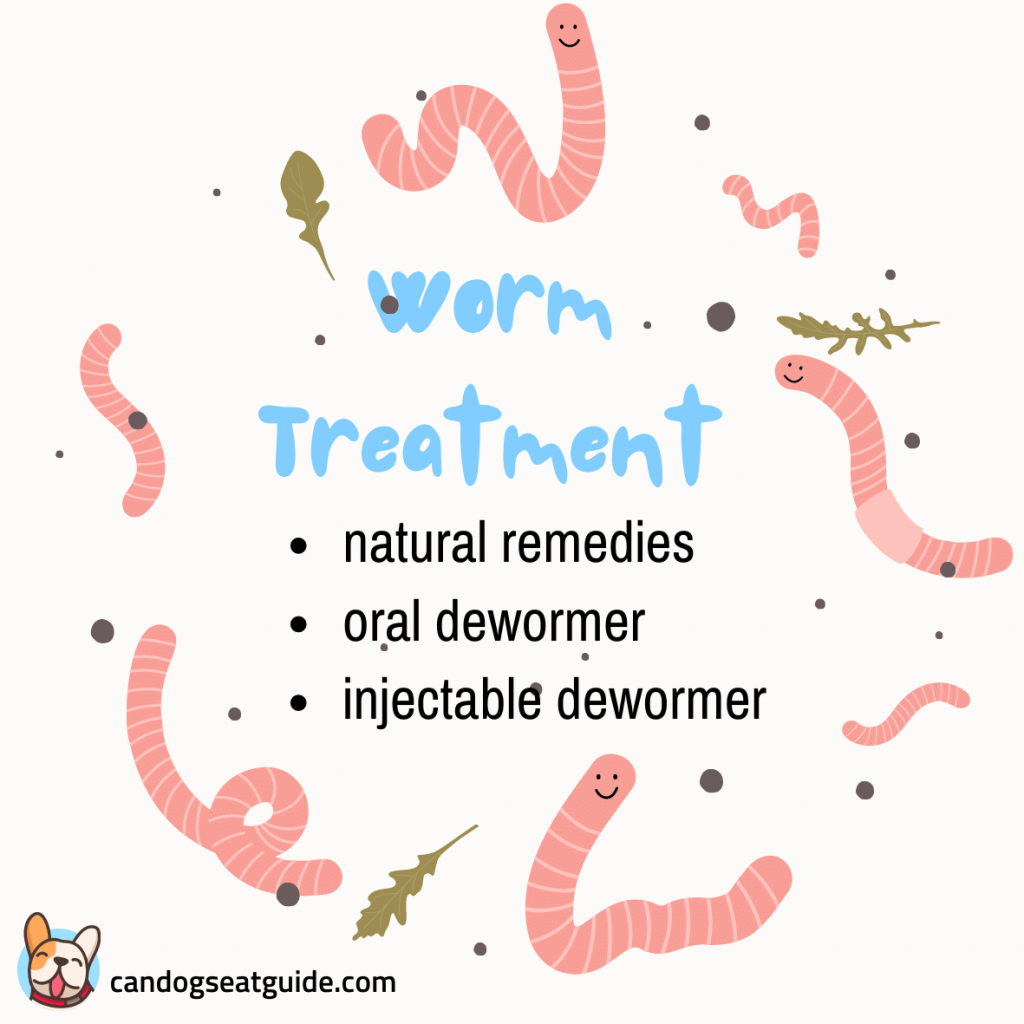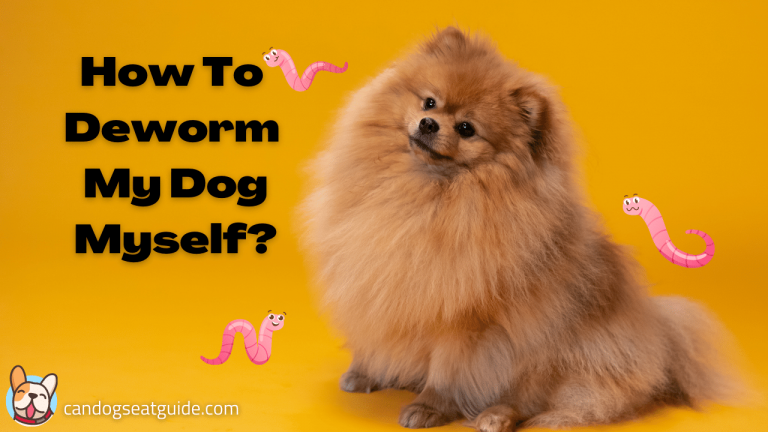As a dog owner, I understand how difficult and scary the period with worms can be for both of you – you and your dog.
But you are not alone and today I will give you a complete guide for worms in dogs.
We will get to know the first signs of worms in dogs, symptoms that dogs can have because of worms, and how these worms will be threatened.
What Are Worms In Dogs?
First of all, don’t worry, worms are pretty common and if your dog has worms the fault isn’t in you.
Let’s start with what are actually the worms.
Worms are parasites, that live and feed off of another organism (human or animal).
As you understand worms can be in humans too.
Examples of these parasites besides worms are also fleas, ticks, and Giardia.
Types of Worms
Here is a list of types of worms in dogs that are very common:
- Roundworms – they are visible to the naked eye with a length of 3-5 inches and look like spaghetti;
- roundworms do not cause any major illness but still can make your dog very ill.
- Whipworms – smaller than roundworms like ¼” long;
- Hookworms – are not visible to the naked eye because they are the smallest type;
- can cause life-threatening anemia to dogs of every age, especially to puppies.
- Tapeworms – they can grow to 8 inches in length and look like rice grains on your dogs’ fur;
- Heartworms.
Whipworms, hookworms, and tapeworms are a big threat when they are in increased amounts.
Although all these kinds of worms in dogs are dangerous heartworms are the most dangerous ones. Heartworms can get to your dog by mosquito bites. They can grow and multiply fast in your dog’s heart. Can cause lung and organ diseases. If left untreated, they can cause serious problems to the dog’s heart.
Heartworms can be easily detected by a blood test but sometimes vets require an ultrasound, radiograph, or echocardiogram.
How Can Dogs Get Worms?

Dogs can get worms from absolutely everywhere.
As soon as your dog interacts with the environment there is a chance your dog to get worms.
Dogs can get worms by sniffing, stepping in, and licking contaminated soil, or coming in contact with already affected animals.
Dogs can get tapeworms from eating something that already has live tapeworms. For example, birds, reptiles, or rodents.
Roundworms can be contracted by eating the eggs of infected animals, or by eating mice that already had the parasites. But there comes one a bit problematic reason for roundworms. Your dog can get this type of worm also only by sniffing the poop of another dog. Which doesn’t feel good but our dogs love to sniff everything around.
Hookworms are passed in the feces.
Signs Of Worms In Dogs
Signs like diarrhea, vomiting, coughing, and lethargy are generally the main symptoms of worms in dogs. But some of them can be mistaken for food problems.
But let’s see the signs that every kind of worm can cause:
- Roundworms:
- Diarrhea;
- Weightloss;
- A dull coat;
- Lethargy.
- Whipworms:
- Chronic weightloss;
- Bloody diarrhea;
- A visible mucus coating on the feces.
- Hookworms:
- Anemia;
- Weakness;
- Lethargy;
- Bloody diarrhea.
- Tapeworms:
- Itching;
- Scooting;
- Chewing at the rear end;
- Rapid weightloss.
The biggest sign that you can notice is visible segments that look like grains of rice attached to the fur around their bottom or on their tail (or in their feces).
What To Do If My Dog Gets Worms?
If you see that your dog starts to act strange and notice any of the symptoms that we have mentioned already, make sure to call your vet as soon as possible.
Don’t delay because your dog’s health is important.
If worms in dogs are left untreated they can spread in the body and cause damage to the heart, lungs, liver, eyes, and brain.
2 Easy Ways of Worm Treatment

1. Natural Remedies
Some veterinarians don’t recommend natural remedies because they consider them a waste of time and money.
Yes, sometimes it’s much faster to bring remedies than get in touch with your vet, but some remedies may harm even the dog’s stomach.
I still want to share a few natural remedies that may help your dog. I will share only these that I am fully sure can’t harm your dog.
So, here we go:
- Veggies and fruits like carrots, bananas, apples, and coconut are considered natural dewormers. They are high in fiber which helps the dog’s digestive system.
- Pumpkin seeds contain cucurbitacin which is known as a dewormer compound. It paralyzes worms in dogs and prevents them from holding on to the intestinal wall of the dog’s body.
- Turmeric
- Turmeric has anti-inflammatory property which helps to decrease the inflammation in your dog’s digestive system and helps cure the damage that worms have already done.
- Antioxidant property that helps the liver to remove all toxins that were left by worms.
2. Medicine
For tapeworms, there are tablets and injections. This medication breaks up tapeworms in the intestine and makes them too small to be seen in the feces.
There is a wide variety of treatments for whipworms. Often vets require 3 months circle of treatment.
Hookworms are treated by oral medication and it needs 3 to 5 days to work and a week to get rid of adult worms completely. For baby hookworms that couldn’t be treated on the first attempt, there must be a follow-up medicine in 2 to 4 weeks.
If you want to know more examples of medicine you can check our article on dog dewormers and worm medicine.
Your vet may prescribe oral or injectable dewormers, depending on the type of worm, and according to the health of your dog.
1. Oral Dewormers
Broad-spectrum medications can be used for roundworms, tapeworms, whipworms, and hookworms, and usually, dogs need more than one dose. The vet’s prescription should be strictly followed.
Oral dewormers usually don’t cause severe side effects, but effects such as mild diarrhea, vomiting, and temporary loss of appetite are normal.
2. Injectable Dewormers
There is a one-time injectable treatment for tapeworm infections.
As with any other injection, there are side effects such as pain, swelling, and inflammation at the place of injection.
What My Vet Needs To Know?
First of all, your vet needs to know all the signs you have noticed like what you have seen in the dog’s poop; if it is vomiting; if it has diarrhea, the vet of your dog needs to know absolutely everything.
Then your veterinarian will ask you for a fresh poop sample because it needs to be checked under a microscope for dead worms and also check which type of worms your dog has.
Usually, the sample is a teaspoon size which will be enough.
If you can’t collect any fresh samples that won’t be a problem for your vet. Veterinary staff will do it on their own.
What My Vet Will Do To Help My Dog?

Your vet will examine the sample to check for the type of worm.
When they know the type they will give deworming medicine to your dog.
Will ask you to give them regular updates so they know if the medicine is working.
Then they will advise you to give deworming medicine every 3-4 months so your dog doesn’t get worms anymore and you can feel a bit relaxed.
How To Keep My Dog Safe And Away From Worms
There isn’t a unique way of worm prevention. As long as you maintain your dog’s hygiene, vet appointments, and keep fleas and ticks under control, everything seems to be fine.
Your dog needs dewormers not only when worms are already inside it, but also because they need it as a preventive measure.
For heartworms is a must to take annual tests and take preventative medicine.
Worms In Puppies
It’s important to be known that puppies can get worms more often than older dogs, especially in the first few weeks.
They can get worms from their mother or her milk if there was no deworming treatment before pregnancy.
Puppies should be dewormed every 4 weeks for the first 4 months at least.
After the first 4 months of the puppy’s life, you should keep continuing the deworming process a few times a year.
A. Signs Of Worms In Puppies
A pot belly is the first sign that you may notice, the stomach is full of worms. Other signs are the signs that are in older dogs like vomiting, and diarrhea. And here we can add constipation and failure to thrive.
A large number of worms can kill a puppy.
B. Deworming Medicine For Puppies
When you or your vet give deworming medicine to your puppy, worms won’t go out immediately.
It will take around 2 to 14 hours and it’s still not sure if all worms will be out of your puppy.
Puppies may get diarrhea or experience lethargy after the deworming medicine and that’s normal. It will last between 24-48 hours. But if it persists then go to your vet.
Don’t forget to give a follow-up deworming medicine because you can never be enough sure if all worms are out of your puppy’s body. The follow-up treatment should be given in 2 weeks.
How To Give Dewormer To My Dog?
The tablets should be given by opening the dog’s mouth and pushing the tablet over the back of the tongue so that it cannot be rejected. Alternatively, a tablet can be wrapped in a piece of meat or butter and offered to the animal or crushed and mixed with the food.
If it is a liquid dewormer you can give it to your dog by syringe.
Injectable dewormers are better if given by vets. It’s safer for dogs and you will feel calmer.
How Often Should I Deworm My Dog?
Puppies should be dewormed from week 2 of their life and dewormed every 2-4 weeks until they are 4 months old. That is because their immune system is still immature.
Lactating mothers should follow the same regime as their puppies.
Dogs should be dewormed once every month.
We have a question for the owners that have more than one dog.
Do you deworm dogs all at once or there is a delay of some days?
If you have answered that you deworm all of them together, then that’s the right answer.
Don’t think that if there is a period between deworming there will be some long-lasting dewormer. It’s totally the opposite.
You put your dogs at risk when you don’t deworm them all together.
There is no use in deworming one dog, 3 days later another, and 4 days later another one.
Yes, dewormers will work but there is still a big chance there to be left worms in dogs.
When Should Be The First Deworming?
The first deworming in many vets’ opinions should be when the puppy is 2 to a maximum of 3 weeks old. That is needed because the first worms in dogs can be passed through pregnancy or soon after birth by the mother’s milk.
It will need more than one dose. They should be dewormed every 4 weeks until the puppy is 4 months old at least.
The first dose kills the parasites that are already in the puppy. The next doses are for the next worms.
Can I Deworm My Dog Myself?
You can deworm your dog by yourself if you have a prescription from the vet.
Otherwise, it will be too risky for your dog’s health because dosage depends on the type of worm, the stage of your furry friend, the weight of the dog, and their activity throughout the day.
Although some dogs are stubborn about oral medicine, like mine. I have tried a few times to give the tablet in his mouth but this technique didn’t work out so now I mix it in a bit of food and both of us are happy.
Injectable dewormers are better if given by vets. It’s safer for dogs and you will feel calmer.
Can Humans Get Worms From Dogs?
Yes, we can get worms from our dogs.
You can get hookworms through skin contact and not only by dogs. For example, if you walk barefoot on contaminated sand you still can get worms.
Whipworms passed from dogs to humans are very very rare. A different species of whipworms can attack humans but they mustn’t be mistaken for dogs’ whipworms.
Heartworm is also a very rare case. But humans can get heartworm if they are bitten by an infected mosquito. Actually, heartworms never make it to our hearts but still can cause lung damage.
If you are too worried about yourself getting worms, then you can do a few things to prevent them.
Do not let your dog lick you or kiss you and dogs have to sleep on their own bed, not yours.
Conclusion
There are many ways that parasites can get into your dog. They can get them from food, from their toys.
You do not have to get too worried about every walk you take with your dog outside.
Your dog needs fresh air and needs to walk, don’t change their lifestyle only because you are too upset for worms.
As I said already worms in dogs are pretty common.
Keep the hygiene of your dog on point and enjoy your playtime with your four-legged friend.
Let us know if you have questions for worms in dogs that were left unanswered by commenting down below.









